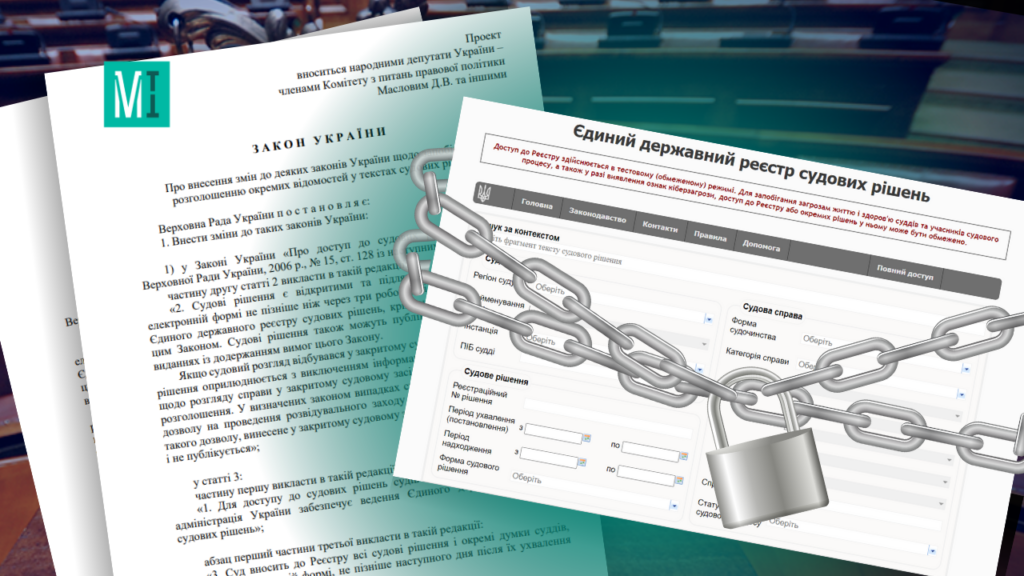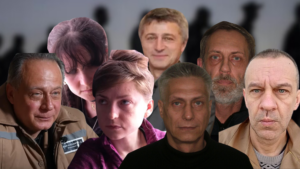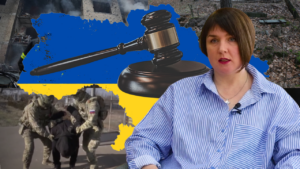We call on the Verkhovna Rada not to adopt draft law № 7033-d, which limits access to court decisions

On May 2, 2024, the Parliamentary Legal Committee reviewed and endorsed draft law № 7033-d for parliamentary consideration. This draft law limits access to information and decisions within the register of court decisions, which hold substantial public interest and are crucial for public oversight of law enforcement activities. The proposed changes undermine the principles of a democratic society and contradict Ukraine’s commitments to European integration.
Draft law № 7033-d already raised public concern in March 2023 but was removed from the agenda after a significant public outcry. However, despite being in the third year of a full-scale Russian invasion and under martial law, MPs are now pushing to vote on it again. This move comes despite earlier warnings from the NACP about corruption risks in the draft law and their recommendation for its revision.
The establishment of the register of court decisions in 2006 was a crucial step in aligning Ukrainian legislation with European standards. This register has consistently ensured the transparency of the Ukrainian judiciary. Restricting access to court decisions would regress Ukraine’s democratic progress by decades, bringing it closer to the levels of Russia and Belarus, and would jeopardize further European integration.
Additionally, the draft law introduces several dubious changes that would apply both during martial law and in peacetime.
Firstly, during martial law and for a year after its conclusion, the draft law proposes to restrict access to court decisions in cases of special public interest. These include crimes against national security, the protection of state secrets, the inviolability of state borders, conscription and mobilization, and military service procedures. Such a restriction is disproportionate and does not meet societal demands. Journalists, lawyers, scholars, and public activists would be unable to access information about the circumstances of these cases or the punishments imposed on state traitors, collaborators, and military personnel. Concealing court decisions would likely increase tension and distrust in the authorities within Ukrainian society, particularly regarding mobilization measures.
Secondly, the draft law plans to grant judges the authority to remove information from court decisions that “may harm security” in cases heard in open hearing. This contradicts the fundamental principle of judicial transparency and introduces corruption risks. Furthermore, judges would make such decisions outside the procedural order, making it impossible to verify their legality and validity. If disclosing certain information is deemed harmful to national security and must be handled in a closed court hearing, Ukrainian legislation already provides mechanisms for this.
Thirdly, the draft law proposes to significantly expand the list of information that cannot be disclosed in court decision texts. The issue is that much of this information is already publicly available (e.g., from pension fund bodies, social protection agencies, local self-government bodies, and the courts), making its concealment unnecessary. Moreover, this provision could facilitate the indefinite removal of numerous decisions from the court decision register, hiding information from existing decisions. Additionally, the draft law stipulates that this provision would apply not only during martial law but also in peacetime, which is unreasonable and would hinder public oversight of court decisions.
Legislation should have a consistent approach to limiting access to information, and thus open data should not be restricted in court decisions. Otherwise, this threatens the normal and effective functioning of the register of court decisions, which is a democratic achievement of Ukrainian society.
The adoption of draft law № 7033-d will restrict the public’s right to freely access information from the court register and oversee court proceedings, especially those with significant public interest.
We urge the Verkhovna Rada of Ukraine to reject draft law № 7033-d, as it undermines the justice system, freedom of speech, and public access to information, particularly during and after the war.
Signed by:
DEJURE Foundation
Human rights center for servicemen and veterans Pryncyp
Kharkiv Anti-Corruption Center
Open Data Association
YouControl
Automaidan
Human Rights Centre ZMINA
Anti-Corruption Center “Mezha”
CHESNO Movement
Anti-Corruption Research and Education Centre (ACREC)
Centre for Economic Strategy
Anti-Corruption Headquarters
Training and consulting center on access to information
NGO GromControl
Center for democratic reforms and media
NGO Human Rights Platform
Media Initiative for Human Rights
NGO “Civil holding “GROUP OF INFLUENCE”
Kharkiv Institute for Social Research
Charitable Foundation «Stabilization Support Services»
NGO “Human Rights Center “DIYA”
NGO “CrimeaSOS”
NGO “Crimean Process”
Ukrainian Legal Advisory Group
Educational Human Rights House – Chernihiv
Advocacy Advisory Panel
OpenUp Ukraine community
NGO “Independent Anti-Corruption Commission”
NGO “DonbasSOS”
NGO “Foundation for Institutional Development”







